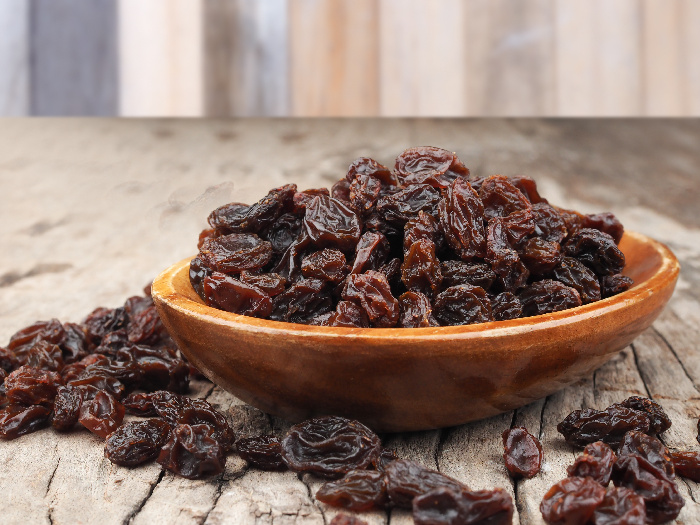Raisins are a dried variety of grapes that are naturally sweet. They are small in size, but vast in their nutrient profile, thereby proving to be beneficial for your overall health. Let us take a look at what makes them healthy and how to add these amazing and nutritious dried fruits to your routine.
Are Raisins Healthy?
According to the USDA Nutrient Database, raisins come in a small but blockbuster package of fiber, sugar, vitamins, calories, iron, calcium, boron, antioxidants, minerals, and antimicrobial compounds. They can aid in digestion and improving bone health. Let us take a closer look at how these nutrients are good for you. [1]
Fiber
A handful of raisins cover your daily 7% to 12% dietary need for fiber. It helps in promoting better digestion by softening the stools and smoothening the bowel movements – thereby preventing constipation. Fiber also keeps you feeling full for longer periods, making raisins a good dietary addition for those looking to lose weight. It also decreases the LDL (bad) cholesterol levels in the body.

Serving Size : Nutrient Value Water [g] 16.57 Energy 296 Energy [kJ] 1238 Protein [g] 2.52 Total lipid (fat) [g] 0.54 Ash [g] 1.89 Carbohydrate, by difference [g] 78.47 Fiber, total dietary [g] 6.8 Calcium, Ca [mg] 28 Iron, Fe [mg] 2.59 Magnesium, Mg [mg] 30 Phosphorus, P [mg] 75 Potassium, K [mg] 825 Sodium, Na [mg] 28 Zinc, Zn [mg] 0.18 Copper, Cu [mg] 0.3 Manganese, Mn [mg] 0.27 Selenium, Se [µg] 0.6 Vitamin C, total ascorbic acid [mg] 5.4 Thiamin [mg] 0.11 Riboflavin [mg] 0.18 Niacin [mg] 1.11 Pantothenic acid [mg] 0.05 Vitamin B-6 [mg] 0.19 Folate, total [µg] 3 Folate, food [µg] 3 Folate, DFE [µg] 3 Fatty acids, total saturated [g] 0.18 14:0 [g] 0 16:0 [g] 0.15 18:0 [g] 0.02 Fatty acids, total monounsaturated [g] 0.02 18:1 [g] 0.02 Fatty acids, total polyunsaturated [g] 0.16 18:2 [g] 0.12 18:3 [g] 0.04 Sources include : USDA [2]
According to research published by James Painter at the University of Texas, “raisin consumption was associated with better nutrient intake, diet quality, and weight parameters, and with a lower risk of being obese and having metabolic syndrome in US adults”. [3]
Potassium
By limiting the effect of sodium, potassium helps in regulating the heartbeat and blood pressure levels in the body. A 300-milligram serving provides you with around 6% of your daily recommended intake of potassium. [4]
Calories and Sugar
A half-cup of raisins contains around 215 calories and 42 grams of sugar, making it the reason why they are not considered as a ‘low calorie’ or ‘low sugar’ treat. This is also the reason why they are often eaten by endurance athletes in place of the expensive gels and chews.
Carbohydrates
If you’re looking for a good source of energy after your workout session or if you’re generally low on carbs, then raisins are your best bet. One cup or 165 grams of raisins contains around 130 grams of carbohydrates. They help in improving your overall performance and are useful for those who are a part of endurance sports like swimming, wrestling, and weightlifting.
Iron
With one cup of raisins containing around 4mg of iron, these dried fruits serve 7% to 17% of your daily requirement of iron. Iron promotes the production of red blood cells in the body and thereby prevents iron deficiency anemia. [5]
Calcium and Boron
Calcium is an essential component in the growth of healthy bones and teeth. For postmenopausal women, calcium also helps lower the risk of developing osteoporosis as you age. One cup or 165 grams of raisins contains around 45 grams of calcium. They also provide the body with a good supply of boron, which keeps your joints healthy.
Antioxidants
Raisins are a good source of phytonutrients like phenols and polyphenols. These antioxidants help fight the free radicals in the body and prevent cell and DNA damage. This, in turn, helps to lower the risk of various conditions. [6]
Antimicrobial Compounds
The phytochemicals in raisins such as linoleic acid, oleic acid, and linolenic acid help fight the harmful bacteria in your mouth that can lead to infected gums and cavities. These dried fruits make sure you maintain your carefree smile! [7]
How to Add Raisins to Your Diet?
There are many healthy ways to add raisins to your diet. The easiest and the best way to eat them is straight out of the box. You can also try any of the below-given raisin recipes.
- Oatmeal raisin cookies
- Raisin spread
- Cinnamon raisin cashew butter
- Quinoa, almond, and raisin salad
- Chicken salad with raisins
- Pumpkin and raisin muffins
You can add them to many other recipes including pasta, porridge, and cakes. You can dry the grapes at home by simply exposing them to the sun for 3-4 days and then enjoy their warmth and aromatic taste in the form of raisins!
